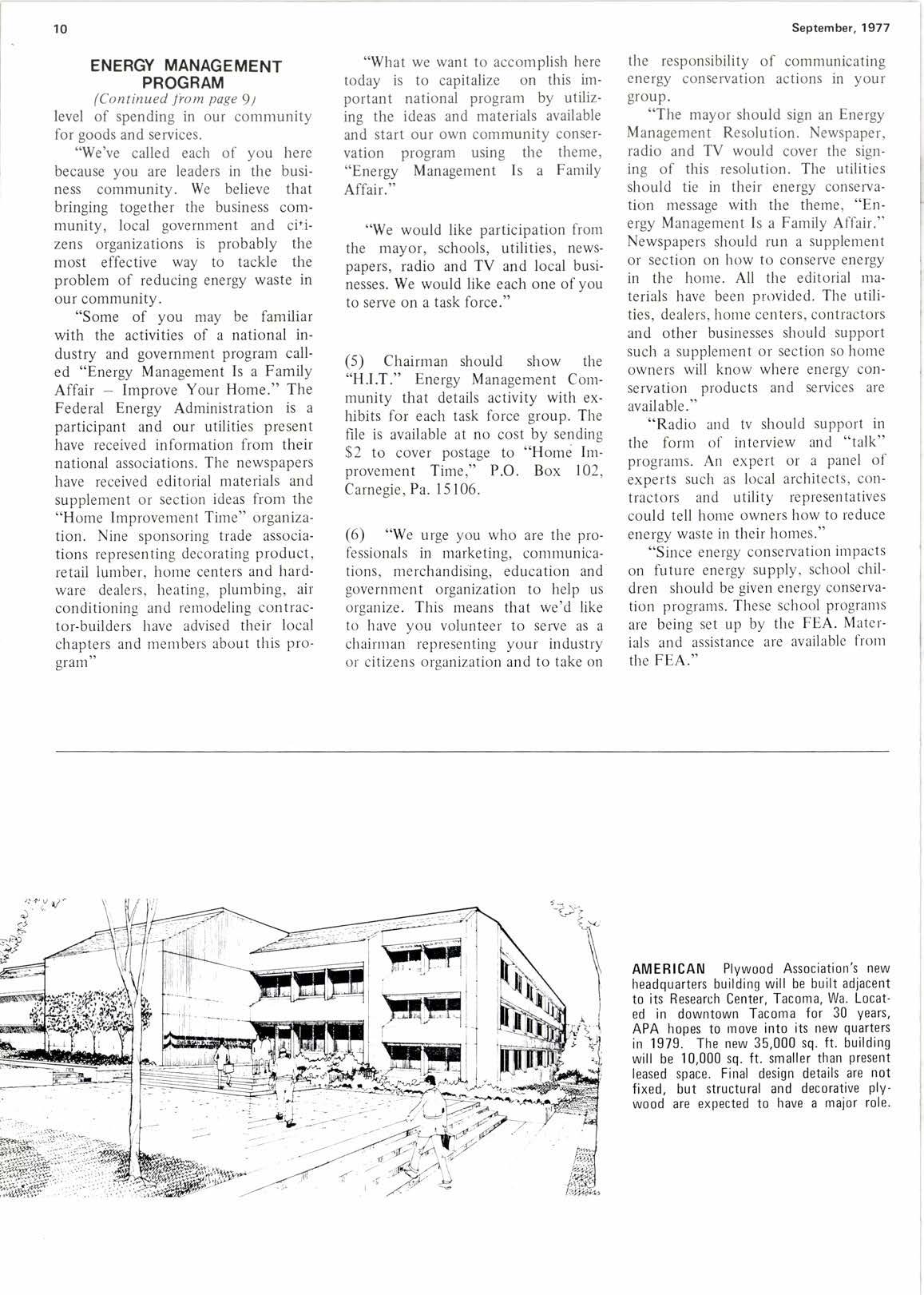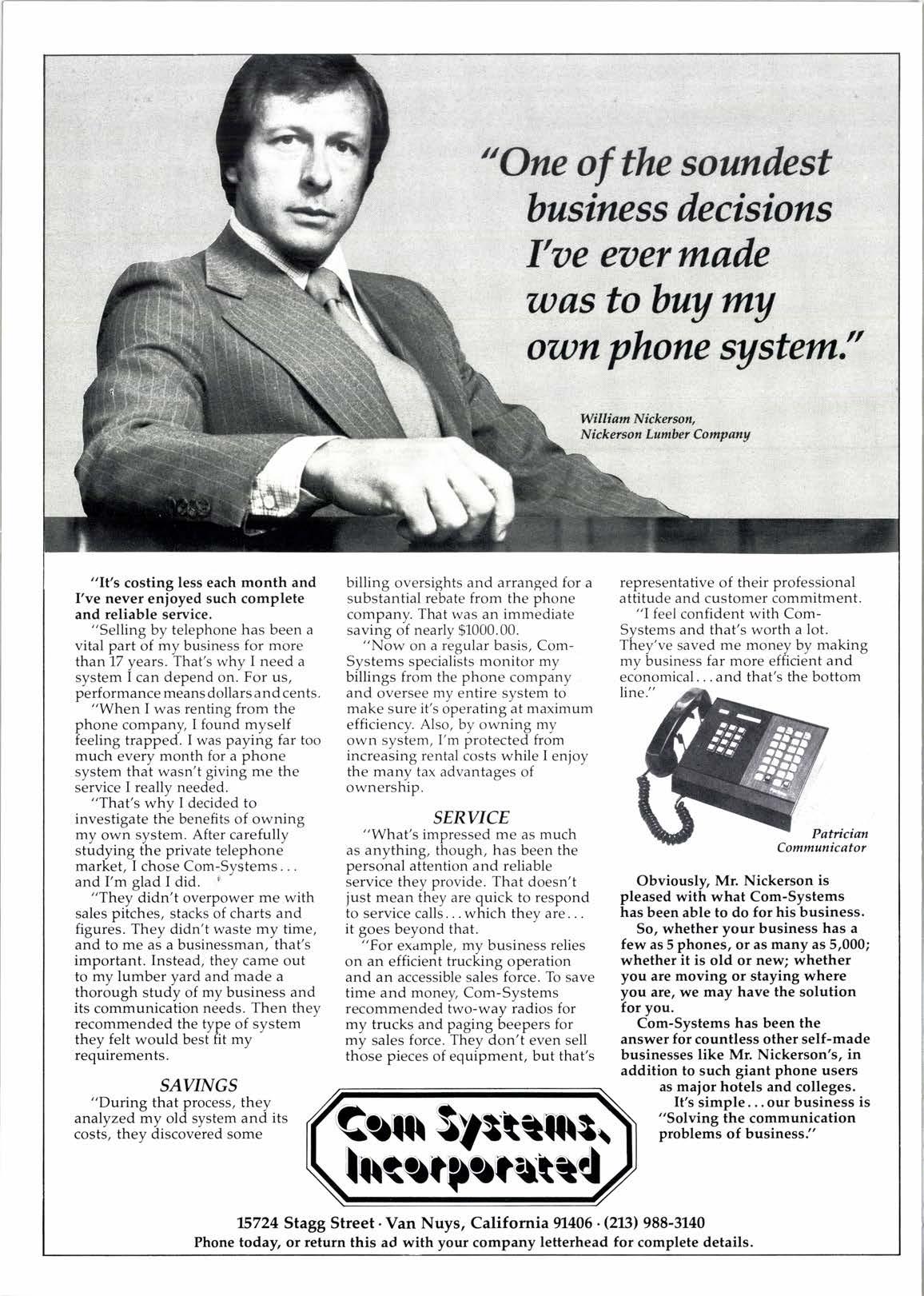
3 minute read
ENERGY MANAGEMENT PROGRAM
(Continued Jrom page Q1 level of spending in our community for goods and services.
"We've called each of you here because you are leaders in the business community. We believe that bringing together the business community, local government and citizens organizations is probably the most effective way to tackle the problem of reducing energy waste in our community.
"Some of you may be familiar with the activities of a national industry and government program called "Energy Management Is a Family Affair - Improve Your Home." The Federal Energy Administration is a participant and our utilities present have received information from their national associations. The newspapers have received editorial materials and supplement or section ideas from the "Home Improvement Time" organization. Nine sponsoring trade associations representing decorating product, retail lunrber, honte centers and hardware dealers, heating, pluntbing, air conditioning and remodeling contractor-builders have advised their local chapters and menrbers about this program"
"What we want to accomplish here today is to capitalize on this important national program by utilizing the ideas and materials available and start our own community conservation program using tl.re theme, "Energy Management Is a Family Affair."
"We would like participation from the mayor, schools, utilities, newspapers, radio and TV and local businesses. We would like each one of you to serve on a task force."
(5) Chairman should show the "H.1.T." Energy Management Conrmunity that details activity with exhibits for each task force group. The file is available at no cost by sending $2 to cover postage to "Home Improvement Time," P.O. Box 102, Carnegie, Pa. 15106.
(6) "We urge you who are the professionlls in marketing. conrnrunications, merchandising, education and government organization to l.relp us organize. This means that we'd like to have you volunteer to serue as a chairman representing your industry or citizens organization and to take on the responsibility of communicating energy conservation actions in your group. ln 1952 Jack went to work for Standard Lumber Co., long-established
"Tl.re mayor should sign an Energy Management Resolution. Newspaper, radio and TV would cover the signing of this resolution. The utilities should tie in their energy conservation nlessage with tlre theme. "Energy Management Is a Family Affair." Newspapers should run a supplement or section on how to conserve energy in the honre. All the editorial materials have been prtrvided. The utilities, dealers, horne centers, contractors and other businesses should support such a supplement or section so home owners will know where energy conservatior] products and services are available."
"Radio and tv should support in the fornr of interview and "talk" progl ams. An expert or a Panel of experts such as local architects, contractors and utility representatives could tell honre owners how to reduce energy waste in their homes."
"Since energy conservation inlpacts on future energy supply, school children should be given etlergy conseryation prograrns. These school progrants are being set up by the FEA. Materials and assistance are available from the FEA."
AMERICAN Plvwood Association's new headquarters building will be built adjacent to its Research Center, Tacoma, Wa. Located in downtown Tacoma for 30 years, APA hopes to move into its new quarters in 1979. The new 35,000 sq. ft. building will be 10,000 sq. ft. smaller than present leased space. Final design details are not fixed. but structural and decorative plywood are expected to have a major role.


II F YOU ask Jack Tweedy, the one man wholesaler will not only survive but live happily ever after. That's the opinion of a wholesale lumberman who is alive and well and not about to give up the ghost to Big Company competition. "Not after twenty-five years in this business," Jack says, "where I've learned that while some things change through the years, the fundamentals of this business don't seem to."
He first moved to southern California after World War II, from Ohio where he had a job in a retail lumber yard. "After I got out of school I found it was the only job I could get," Jack recalls, and upon arriving in Los Angeles, where he's been ever since, he found another job in a retail company, Crown City Lumber & Mill. Three years later, in 1950, he left Crown City for his first experience in the wholesale business, taking a job with Anglo California.
Was the retail lumber yard expeience helpful to him?
"I firmly believe," Jack comments, "that the wholesaler who's spent some time in the retail business must benefit from it." At the very least, he thinks, the wholesaler will have a deeper appreciation and understanding of the retailer's needs. "The retail end of the business has changed considerably over the years, much more so than the wholesale business, and being able to talk the 'retailer's language' is helpful in anticipating their purchasing requirements."










